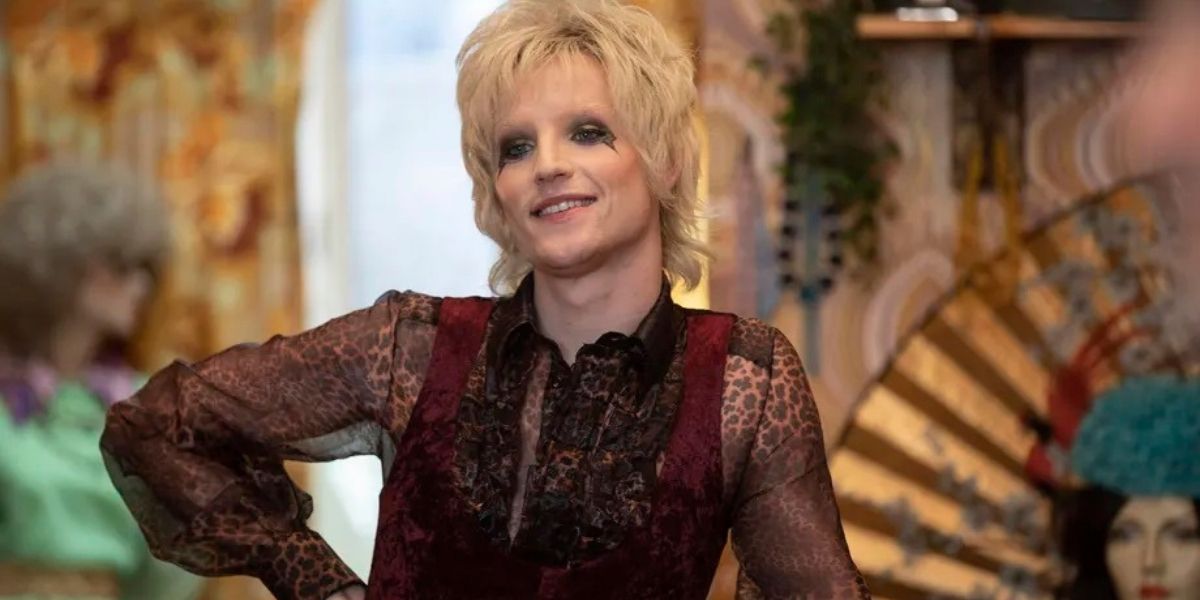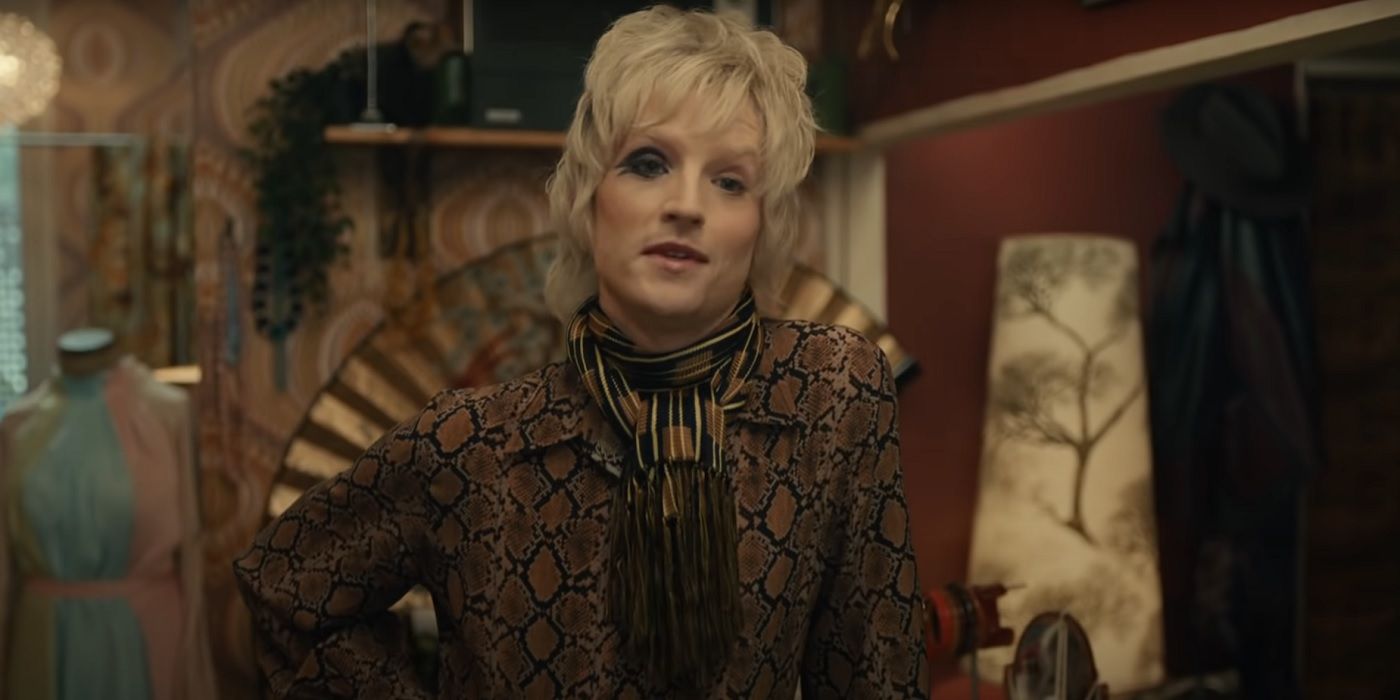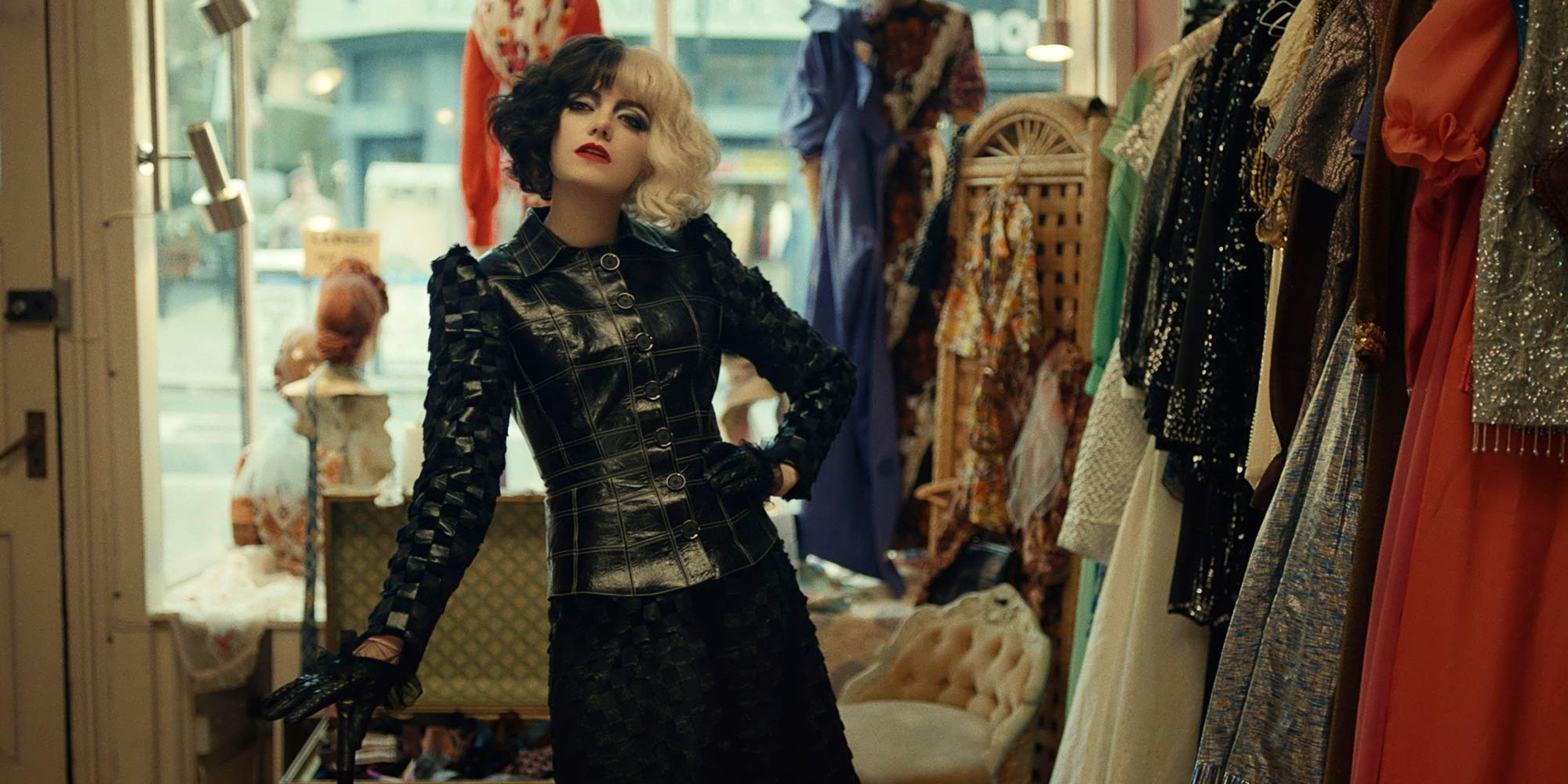
Cruella takes the story of 101 Dalmatians and turns it into a music and fashion extravaganza, thriving in its setting of the 1970s London punk rock scene. The latest live-action Disney adaptation, out May 28, pushes the envelope in many ways – especially when it comes to the character of Artie.
John McCrea spoke to Screen Rant about taking on such a non-conforming role in a Disney film, and why Artie is such an important aspect of Cruella’s message and theme.
What first drew you to the role of Artie?
John McCrea: I think his philosophy for life, his need to not conform, and his impeccable style.
What do Artie and Estella see in each other that makes them want to work together?
John McCrea: I think he understands that she has an eye. She comes into a shop and manages to name each dress and where it's from, so they have that love and passion for fashion. And I think he understands that, as the film goes on and her desire to overtake the Baroness becomes greater and maybe her moods and her behavior become more and more questionable - I think he understands that temperament, and he understands that some allowances needs to be made. Because she's got these ideas bursting to get out of her.
I think he's a very calming character to have around; he doesn't really get swept up in the drama very easily. He's very level headed, so I think they needed someone like him around.
Absolutely, he kind of seems unbothered by Estella's change to Cruella. Why do you think that is?
John McCrea: Because I think he's all about transformation as the years go by. I think he's like a Madonna. If you were to meet Artie in the 80s, you wouldn't recognize him. Because he's forever changing.
Artie and Estella quickly form a kinship during their first interaction. Do you think he sees something in Estella that he also sees in himself?
John McCrea: Oh, totally. I think he sees an underdog walk into his shop; an underdog who loves fashion and who expresses herself in the way she dresses with this beautiful red hair.
And I think you know, don't you, when you meet someone. You go, "Oh, they're a bit me. That's my cup of tea." They could say nothing. Sometimes I've just seen people walking down the street, and I think, "We'd get on like a house on fire." I think it's an instinct. It's an animal instinct, isn't it?
Does the 1970s setting affect your portrayal of Artie in any way? If it was any other time period, would it have affected the way you portrayed him?
John McCrea: I don't. I think interestingly, it probably wouldn't have. Because I think he is so living authentically as himself that I think you could [play him the same], within reason - obviously, you can put him into many periods of time. But I think he was challenging the status quo. Maybe if he was around now, he'd have perhaps a somewhat easier time than he did then. But I think he's pretty adaptable.
You can throw him into a lair, as they do with Jasper and Horace and this crazy woman who says she has this plan, and he just goes, "Yeah, alright then." I think he could be anywhere and do anything, and he'd absolutely find his way somehow.

The way that Cruella incorporates fashion is so important. How much fun was it to work with those costumes and participate in the fictional world of London's fashion scene?
John McCrea: It was one of the best things about the job, and there were so many great things about it. Going into costume fittings are usually pretty boring and arduous, but I used to just pray that my phone would ring and they'd ask me to go for another costume fitting. Because every time I went in, Jenny Beavan had a different outfit.
And there were so many that that you didn't get to see, because you always have to over prepare. They were just amazing; we walked on to second and would see all of those outfits that everybody rocks, and everybody has such a specific color palette. Sitting in the makeup trailer every day was my favorite part of the day. And again, usually it's pretty boring and pretty dull, but not on this job. I loved it.
I almost want to see a coffee table book of everything that they didn't release, because I'm not even a fashion person and I was like, "Wow, that's quite amazing."
John McCrea: I think she must have broken some records for the amount she had to do. I think you could zoom into the screen and find some random character in the background, and the attention to detail will still be as if they were going to have a close up at any moment. No corners were cut at all.
Can you talk to me a little bit about Artie's wardrobe and his style a little bit in this period?
John McCrea: I think he was definitely a bit of a head turner when he walked down the street in 70s London, but I think it's because he is probably very much in the forefront of that punk movement. He's a bit New Romantic as well; he's got lots of David Bowie and Marc Bolan influences. And it's actually interesting, because you never really know - especially with that time specifically - whether the fashion's influencing the music or the music's influencing the fashion. It's kind of cyclical.
He also has such a specific color palette that I think when you first read him on the page, or you describe the character to someone, you automatically assume pinks and purples and silver. There's an assumption you make, but actually we go against it - as this film does in every aspect. We constantly rip the carpet out from underneath people and they say, "That's what you thought? Well, guess what?"
What did you want to bring to the role of Artie that wasn't necessarily on the page?
John McCrea: I didn't really think about it at the time. When the writing is as good as it was, then you don't really have to do much more. But I think there's probably somewhat of a subtlety - people are just gonna say, "Yeah, right." But I could have been a lot bigger with it than I was, and I think that would have been the wrong decision to make.
Because automatically, when you get sent these characters, usually the assumption or the instinct is to go really big. And that tends to get a bit annoying, or it seems a bit baseless. It doesn't seem like it's coming from somewhere authentic. So, whenever I was thinking about what to do in my bedroom or going through [scenes], I'd always take it back at least two steps.
There's a strong theme of found family running through Cruella, and we see hints of Artie finding his family with Cruella and her gang. Did that translate behind the scenes, and can you talk to me about working with that cast?
John McCrea: Yeah, it's definitely one of the happiest jobs I've had. Not just from the cast, but from everybody, like the crew and everybody. And my expectation of going into a job like that was not that; I thought it was going to be up against it timewise, and we would be miserable a lot of the time because there's so much on the line. I had these wrong assumptions about doing it, and everyone was really happy. And it definitely was a family.
In terms of the stuff with Paul, he's such a wonderful actor. He's so funny, and such a great improviser. And I think, again, if you were to look at two people that you knew nothing about, you'd assume that those two people would have the least in common. We just went, "Well, you're wrong." That's what I love about this movie. I think they're probably great friends, and they pop down to the pub. I think it's wonderful.
I also love the first conversation that Artie has with Estella, when asked how his look is received on the streets. Why do you think that's an important moment to include in the film?
John McCrea: Because I think it would be wrong to assume that prejudice doesn't exist. It's not fantasy. Yes, it's based on a cartoon, but it's not like The Little Mermaid which is set under the sea. 70s London did exist, and it would be a missed opportunity to pretend that there weren't two subcultures then. And also that he just worked in his shop, and then did nothing else; then his life stops. He has to get home, and heads will time. But he doesn't mind.
Your director, Craig Gillespie, understands telling a visual story and adding the elements of music and fashion that work together perfectly. Can you talk to me about the collaboration process working of with Craig?
John McCrea: The minute I audition for the role, I could tell that he was keen on improvisation and collaboration, which was a joy and a dream. He has such a specific vision that - and I think it sound like a broken record - you just don't immediately think of when you think Disney movie, and I think that's why it works. It's a big-budget Disney movie that was shot like an independent film. There was a real sense of freedom on set that was just so much fun to play with.
His taste level and his knowledge of music really comes through as well. This is one of the best soundtracks I've heard such a long time.

I know that in previous drafts, you were aware that Artie was going to be a drag queen. Were you able to have input into the character, the character that we saw that made it to the screen?
John McCrea: Yes, there was definitely a level of input. But that change came, actually, before we started shooting. I remember when I auditioned for it, that was the case. I remember thinking, "God, wouldn't it be more interesting if actually, it was a lifestyle?" And I guess, just by pure serendipity, they were having exactly the same thoughts at exactly the same time. I didn't even need to say it by the time they'd come to me and said, "Listen, we're thinking of changing things up." So, I worked out for the best.
You were amazing in Everybody Loves Jamie, and obviously you know music always helps tell the story. What story would you say the music is telling in Cruella?
John McCrea: There’s such great diversity on there in terms of sound. You've got a bit of everything everywhere. So, I think the music of this story is just... It's a tough one. I think it's all about subverting ideas, breaking rules, and challenging the status quo.
The very idea of humanizing a would-be puppy murder is shocking. But what aspects of this Disney adaptation were most shocking and surprising to you?
John McCrea: Oh, that's a good question. At the time, I didn't think about it. But I guess going away from it is - I hate to sound completely conceited, but it's my character. I didn't expect to see someone like that in a Disney movie, and I'm just so thrilled that they have.
If you could turn Cruella into a musical, what kind of song would Artie sing?
John McCrea: I think he'd have to reprise his very famous performance of "I Wanna Be a Dog." Give the people what they want. And then I think he'd probably do some weird Bowie-esque number, where he started really slowly and he was wearing some sort of weird outfit. The possibilities are endless.
If there's a sequel to this, where would you like to see your character go next?
John McCrea: Oh, my God. I'm not sure because again, I just think it's open to such interpretation. I'd be interested to see how, visually, he's changed. Because like I said to you, I think he really is transformative. So, it would be really interesting to see what he's rocking and what trends he may be following or setting.
Cruella is now playing in theaters and streaming on Disney+ Premier Access.
https://ift.tt/3wU6RyP
June 04, 2021 at 12:20AM





